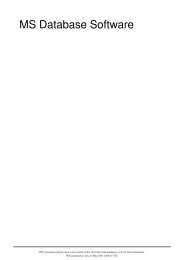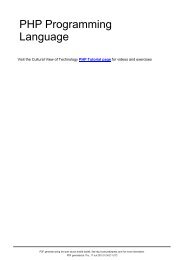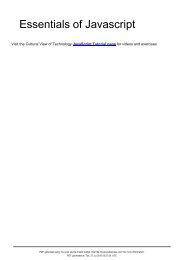- Page 1 and 2:
Contents Articles Java (programming
- Page 3 and 4:
Michael Kölling 212 List of Java k
- Page 5 and 6:
Java (programming language) 1 Java
- Page 7 and 8:
Java (programming language) 3 Stand
- Page 9 and 10:
Java (programming language) 5 Examp
- Page 11 and 12:
Java (programming language) 7 dialo
- Page 13 and 14:
Java (programming language) 9 drawS
- Page 15 and 16:
Java (programming language) 11 to s
- Page 17 and 18:
Java (programming language) 13 See
- Page 19 and 20:
Java (programming language) 15 [41]
- Page 21 and 22:
AgentSheets 17 year, per school. Of
- Page 23 and 24:
AgentSheets 19 References [1] Cyber
- Page 25 and 26:
Lightweight Java 21 Lightweight Jav
- Page 27 and 28:
.properties 23 See also • java.ut
- Page 29 and 30:
Apache Harmony 25 Sun answered on a
- Page 31 and 32:
Apache Harmony 27 Component Descrip
- Page 33 and 34:
Apache Harmony 29 [10] Gilbert, Dav
- Page 35 and 36:
Apache Shiro 31 Apache Shiro Develo
- Page 37 and 38:
Java applet 33 there are frequently
- Page 39 and 40:
Java applet 35 } } g.drawString("He
- Page 41 and 42:
Java applet 37 The 2002 Sun - Micro
- Page 43 and 44:
Java applet 39 [18] W3.org (http:/
- Page 45 and 46:
Associació d'Usuaris de Java de Ca
- Page 47 and 48:
Associació d'Usuaris de Java de Ca
- Page 49 and 50:
Associació d'Usuaris de Java de Ca
- Page 51 and 52:
Associació d'Usuaris de Java de Ca
- Page 53 and 54:
Bean Scripting Framework 49 Bean Sc
- Page 55 and 56:
CJAN 51 Ostensibly, CJAN.org failed
- Page 57 and 58:
Chainsaw (log file viewer) 53 Chain
- Page 59 and 60:
clone (Java method) 55 Alternatives
- Page 61 and 62:
clone (Java method) 57 } } abstract
- Page 63 and 64:
Comparison of Java and C Sharp 59 A
- Page 65 and 66:
Comparison of Java and C Sharp 61 R
- Page 67 and 68:
Comparison of Java and C Sharp 63 T
- Page 69 and 70:
Comparison of Java and C Sharp 65 f
- Page 71 and 72:
e="6.73"> = 42; = null; Comparison
- Page 73 and 74:
Comparison of Java and C Sharp 69 L
- Page 75 and 76:
Comparison of Java and C Sharp 71 I
- Page 77 and 78:
Comparison of Java and C Sharp 73 t
- Page 79 and 80:
Comparison of Java and C Sharp 75 N
- Page 81 and 82:
Comparison of Java and C Sharp 77 L
- Page 83 and 84:
Comparison of Java and C Sharp 79 T
- Page 85 and 86:
Comparison of Java and C Sharp 81 C
- Page 87 and 88:
Comparison of Java and C++ 83 C++ J
- Page 89 and 90:
Comparison of Java and C++ 85 e="7.
- Page 91 and 92:
Comparison of Java and C++ 87 the c
- Page 93 and 94:
Comparison of Java and C++ 89 • D
- Page 95 and 96:
Comparison of Java and C++ 91 Sever
- Page 97 and 98:
Comparison of the Java and .NET pla
- Page 99 and 100:
Comparison of the Java and .NET pla
- Page 101 and 102:
Comparison of the Java and .NET pla
- Page 103 and 104:
Comparison of the Java and .NET pla
- Page 105 and 106:
Constant interface 101 } public sta
- Page 107 and 108:
Java 4K Game Programming Contest 10
- Page 109 and 110:
Java 4K Game Programming Contest 10
- Page 111 and 112:
CookXml 107 Creators, setters, adde
- Page 113 and 114:
Cougaar 109 Cougaar Cougaar is a Ja
- Page 115 and 116:
Devoxx 111 Related links • Devoxx
- Page 117 and 118:
Elastic Path 113 References [1] htt
- Page 119 and 120:
Electronic Disturbance Theater 115
- Page 121 and 122:
Event dispatching thread 117 • Sw
- Page 123 and 124: Facelets 119 The above code can be
- Page 125 and 126: final (Java) 121 } Sphere(double x,
- Page 127 and 128: FormEngine 123 FormEngine Developer
- Page 129 and 130: Generics in Java 125 Motivation for
- Page 131 and 132: Generics in Java 127 Pair grade440
- Page 133 and 134: G-java 129 G-java G-java 2.x was a
- Page 135 and 136: GlassFish Metro 131 Features Metro
- Page 137 and 138: James Gosling 133 Contributions He
- Page 139 and 140: Todd Greanier 135 Todd Greanier Tod
- Page 141 and 142: Head First (book series) 137 Head F
- Page 143 and 144: Inner class 139 • Local class - T
- Page 145 and 146: Interface (Java) 141 The body of th
- Page 147 and 148: Internet Foundation Classes 143 Int
- Page 149 and 150: Internet Foundation Classes 145 •
- Page 151 and 152: JAD (file format) 147 JAD (file for
- Page 153 and 154: JAMWiki 149 JAMWiki Developer(s) Ry
- Page 155 and 156: JGroups 151 JGroups Stable release
- Page 157 and 158: Java Class Library 153 Java Class L
- Page 159 and 160: Java Class Library 155 Alternative
- Page 161 and 162: Java Classloader 157 User-defined c
- Page 163 and 164: Java compiler 159 Java compiler A J
- Page 165 and 166: Java Development Kit 161 • jstack
- Page 167 and 168: Java Interface Definition Language
- Page 169 and 170: Java TV 165 See also • Xlet Exter
- Page 171 and 172: Java Work Framework 167 Database db
- Page 173: Java annotation 169 programmaticall
- Page 177 and 178: Java collections framework 173 Refe
- Page 179 and 180: Java syntax 175 Java syntax The syn
- Page 181 and 182: Java syntax 177 Double quote \" Tab
- Page 183 and 184: Java syntax 179 import statement Th
- Page 185 and 186: Java syntax 181 switch statement Sw
- Page 187 and 188: Java syntax 183 outer: for (int i =
- Page 189 and 190: Java syntax 185 The catch and final
- Page 191 and 192: Java syntax 187 Reference types Ref
- Page 193 and 194: Java syntax 189 Foo.doSomething();
- Page 195 and 196: Java syntax 191 Modifiers • abstr
- Page 197 and 198: Java syntax 193 } public void walk(
- Page 199 and 200: Java syntax 195 Inheritance Interfa
- Page 201 and 202: Java syntax 197 /* Any Mapper insta
- Page 203 and 204: Java: View Technologies and Framewo
- Page 205 and 206: JavaBeans Activation Framework 201
- Page 207 and 208: javac 203 References [1] http:/ / j
- Page 209 and 210: JavaFX 205 profile includes Swing a
- Page 211 and 212: JavaFX 207 External links • Offic
- Page 213 and 214: JExamples 209 JExamples Industry Co
- Page 215 and 216: Jikes 211 Jikes Developer(s) IBM St
- Page 217 and 218: Michael Kölling 213 Microsoft Pate
- Page 219 and 220: List of Java keywords 215 case catc
- Page 221 and 222: List of Java keywords 217 long nati
- Page 223 and 224: List of Java keywords 219 Reserved
- Page 225 and 226:
Name mangling 221 Name mangling In
- Page 227 and 228:
Name mangling 223 } }; }; /* = _ZN9
- Page 229 and 230:
Name mangling 225 if (__1cGstrcmp6F
- Page 231 and 232:
Name mangling 227 ['_Test__private_
- Page 233 and 234:
Name mangling 229 External links
- Page 235 and 236:
Patrick Naughton 231 See also • H
- Page 237 and 238:
New I/O 233 FileChannel can be used
- Page 239 and 240:
New I/O 235 // Pattern used to pars
- Page 241 and 242:
New I/O 237 References [1] "JSR 51:
- Page 243 and 244:
Omniscient Debugger 239 Omniscient
- Page 245 and 246:
OpenJDK 241 Inclusion in software d
- Page 247 and 248:
OpenJDK 243 [12] "Open JDK is here!
- Page 249 and 250:
PHP/Java Bridge 245 References [1]
- Page 251 and 252:
Java package 247 External links jav
- Page 253 and 254:
Parboiled (Java) 249 } } return seq
- Page 255 and 256:
Plain Old Java Object 251 POJO gene
- Page 257 and 258:
Pluggable look and feel 253 Pluggab
- Page 259 and 260:
Primitive wrapper class 255 Primiti
- Page 261 and 262:
Quark Framework 257 Quark Framework
- Page 263 and 264:
Quark Framework 259 has proven to p
- Page 265 and 266:
Quark Framework 261 //illustrates p
- Page 267 and 268:
Quark Framework 263 As well as LECC
- Page 269 and 270:
Quark Framework 265 `catch` (\ex ->
- Page 271 and 272:
REPLAY (software) 267 Qualities REP
- Page 273 and 274:
Real time Java 269 References [1] J
- Page 275 and 276:
Restlet 271 Connectors The list of
- Page 277 and 278:
SLAMD 273 SLAMD The SLAMD Distribut
- Page 279 and 280:
SLAMD Server 275 SLAMD Server A SLA
- Page 281 and 282:
Bruno Souza 277 Bruno Souza Born Na
- Page 283 and 284:
Static import 279 References [1] Ja
- Page 285 and 286:
strictfp 281 Behaviors and restrict
- Page 287 and 288:
Sun Web Developer Pack 283 Sun Web
- Page 289 and 290:
Swing (Java) 285 The Swing Architec
- Page 291 and 292:
Swing (Java) 287 Relationship to AW
- Page 293 and 294:
Swing (Java) 289 } window } See als
- Page 295 and 296:
SwingLabs 291 • JDNC [7] : Contai
- Page 297 and 298:
Synth Look and Feel 293 Supposing t
- Page 299 and 300:
TeachScheme! 295 • a function def
- Page 301 and 302:
TeachScheme! 297 TeachScheme! and B
- Page 303 and 304:
Unified Expression Language 299 Imp
- Page 305 and 306:
Java Virtual Machine 301 Bytecode v
- Page 307 and 308:
Java Virtual Machine 303 Heap The J
- Page 309 and 310:
Xerlin 305 • Steinbrenner, Eugen
- Page 311 and 312:
XStream 307 } and add some of these
- Page 313 and 314:
Article Sources and Contributors 30
- Page 315 and 316:
Article Sources and Contributors 31
- Page 317 and 318:
Image Sources, Licenses and Contrib










